How To Choose A Piano or keyboard
Congratulations! You are about to buy your first piano...
Choosing the right piano to purchase can be thrilling, though somewhat intimidating. Within our ‘Beginner’s Guide To Learning Piano’ series, this segment aims to assist you in beginning your musical journey on the right note.
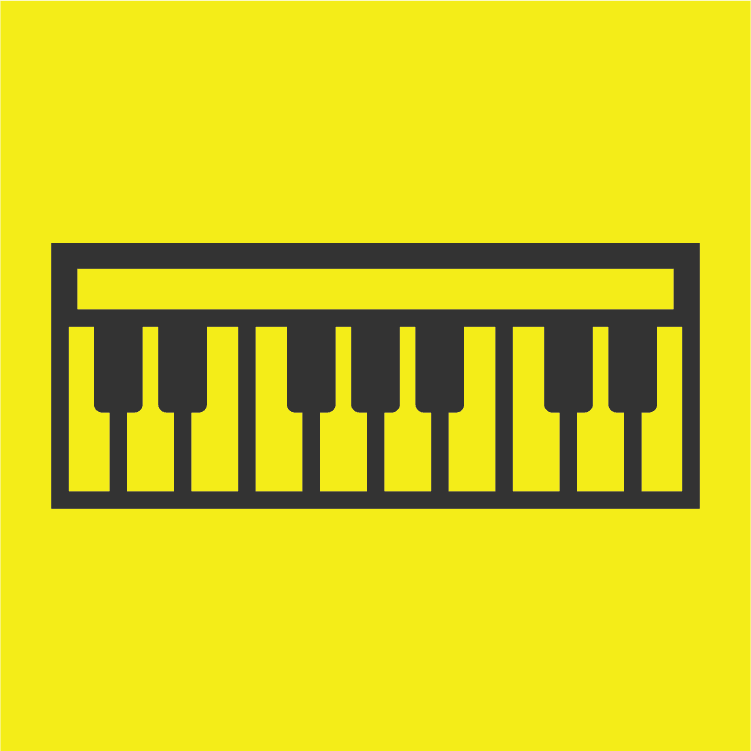
Things you should know before buying your first piano
To decide what piano is best, you’ll need to think about what you intend to do with it. Now, I know you’ll be thinking “what a stupid thing to say! I intend to play it!”, but choosing a musical instrument is based on a series of choices that include:
- What sort of budget do you have? Remember, as with most things in life; you get what you pay for – so try to have the largest budget you can afford
- What type of music do you want to play? Having a £90,000 Steinway Grand Piano is probably not the best instrument for you if you’re only interested in playing a four-chord pop song!
- What space will the instrument be going in? If you live in a studio flat, a small instrument will be necessary. If however, you live in a palace, then perhaps that’s not such an issue… or so Mrs Queen tells me…
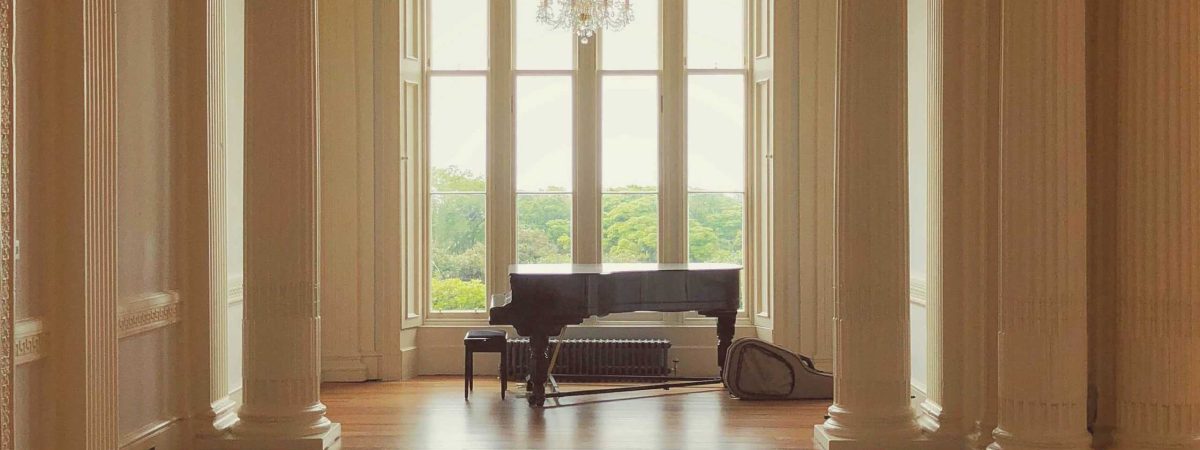
What sort of piano should I buy?
Digital Piano vs Acoustic Piano. That’s the first thing to think about.
This is one of the most straightforward choices to make. If the piano will be in a small room, and if you need to be able to play with headphones, then a Digital Piano is the only option. If you have a larger room and don’t need to be able to play with headphones, then you have to choose based on the next step…
Type of music
Classical Music
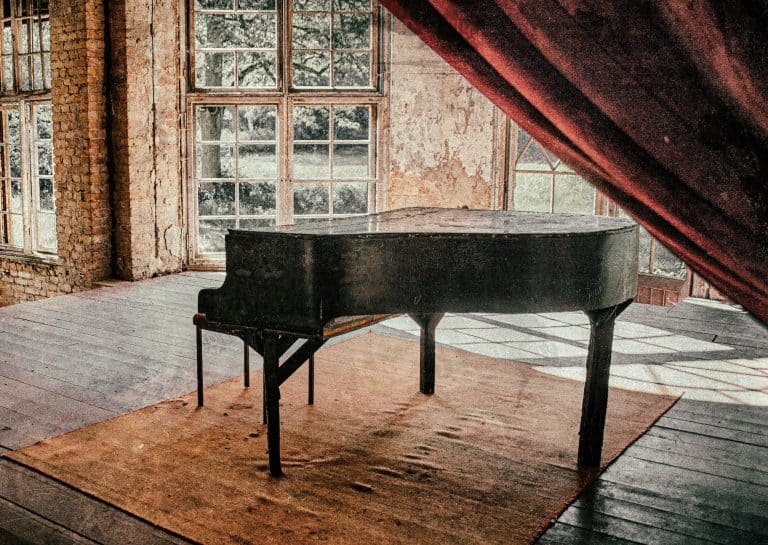
If your primary genre of piano playing is classical, then no digital instrument can ever replicate the touch, feel and sound of an acoustic piano. For me, speaking as a pianist, if you have the space for an upright or grand piano, you’ll progress further and play better. End of story!
Having said that, if you don’t have space or budget for an acoustic piano, then a Digital Piano – not a keyboard, is what you need.
So zoom down to the Upright VS Grand Piano section below.
Popular Music
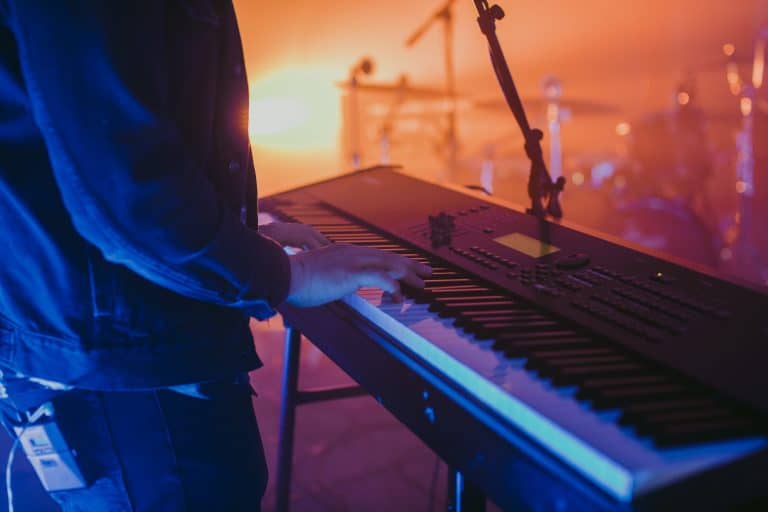
This is where the decisions can get a little blurry. I imagine if you ask Elton John to play a keyboard or digital piano, he will not so politely decline.
However, for most pianists who want to play pop/rock, then a digital instrument is a great option. They are less expensive than their rival acoustic, are smaller, and once again, you can plug in your headphones and play away through the night knowing that no-one is being disturbed.
Take a look at our Digital Piano VS Keyboard section below.
Digital Piano VS Keyboard
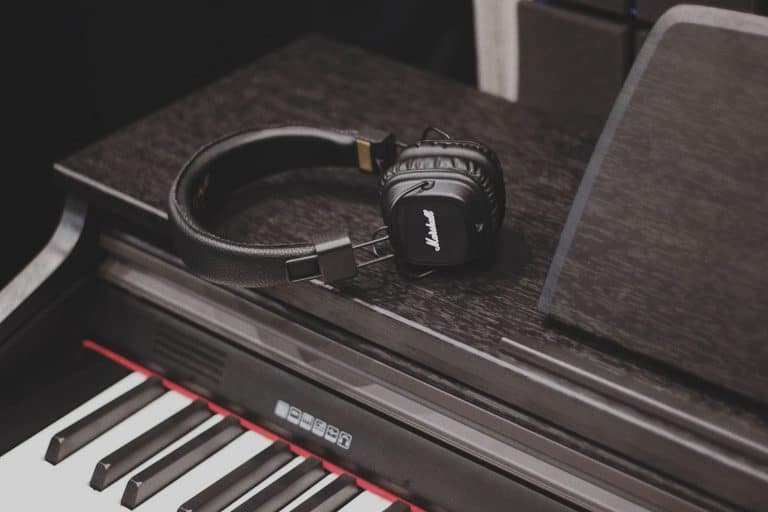
Digital Piano
Digital Pianos are precisely that; a piano that is digital. It specialises in getting as close to a real piano as possible. It does this by:
- 88 notes – all Digital Pianos should have the full-size keyboard of 88 keys.
- Hammer action and weighted keys – they feel more like a real piano. On an acoustic piano, there is resistance when pushing down a key, and a bounce-back when the hammer inside hits the string. Digital Pianos try to mimic this to give a more realistic view.
- Piano Samples – the sound a Digital Piano makes is the closest you’ll get to an acoustic piano. The manufacturers spend a considerable amount of time on the sound samples. They usually have a minimal number of sounds, but the ones they do have are generally excellent.
- If you intend to use headphones then a high quality, noise cancelling over-ear type will not only help you zone in on your performance, but also be comfortable for long sessions.
- The pedals are usually built in, and act the same as the pedals on an acoustic piano.
You may check out our recommended digital piano the Kawai CA49 below:

FEATURES: Elegant Digital Piano with Sound and Feel to Match
INCLUDED ITEMS: updated control panel features a modern OLED graphic display
COLORS & DIMENSIONS: Satin black, satin white, rosewood, polished ebony 53" x 18" x 42"
9/10
Kawai CA49
When you check the price above, you’ll see there are loads of great places to buy this item. Our personal favorite is Gear4music.
It is the largest music retailer in the UK and fast becoming the most respected online music shop in the US too. Their customer service is excellent, they have competitive prices, really fast shipping, and usually have the longest guarantee.
Most professional musicians use Gear4music, so there is no reason why you shouldn’t too!
PROS
- 128 X 128 OLED graphic display
- Progressive Harmonic Imaging sound technology
- Ivory Touch key surfaces
CONS
- A bit expensive
The TedScore™ is our unique system of scoring products.
The professional musician who wrote this article combined many things,
from the product build, manufacturer’s reputation through to feedback
from other users, to create our famous TedScore™.
The professional musician who wrote this article combined many things,
from the product build, manufacturer’s reputation through to feedback
from other users, to create our famous TedScore™.
Keyboard
A keyboard isn’t trying to mimic a piano; its specialism is that it can produce 1,000s of sounds – and even more creatively, you as the user can manipulate those sounds and turn them into other, personalised sounds.
Unlike Digital Pianos, a Keyboard doesn’t necessarily have:
- 88 notes – many varieties exist with 49, 61 or 76 keys
- Weighted keys are not so crucial for keyboards. They are not pretending to be a piano – and therefore keyboards tend to have a lighter action.
- Pedals are never built in, and quite often you’ll need to purchase them separately. And don’t forget to buy a stand too!
The keyboard we really love is the Donner DEP-20 below which is also perfect for beginners.

FEATURES: Lightweight with synthetic ivory feels keys, it can be upgraded with a three-pedal unit and the KSC-70 stand
COMES WITH: Music rest, owner's manual, damper pedal, power cord, and AC adapter
COLORS & DIMENSIONS: Black and white / 51″ x 6″ x 11″
9/10
Roland FP-30X
When you check the price above, you’ll see there are loads of great places to buy this item. Our personal favorite is Gear4music.
It is the largest music retailer in the UK and fast becoming the most respected online music shop in the US too. Their customer service is excellent, they have competitive prices, really fast shipping, and usually have the longest guarantee.
Most professional musicians use Gear4music, so there is no reason why you shouldn’t too!
PROS
- USB and Bluetooth
- Lightweight design
- Easily portable keyboard
- SuperNATURAL sound engine
- Range of sound effects
- Accurate acoustic piano sound
CONS
- No lesson functions
The TedScore™ is our unique system of scoring products.
The professional musician who wrote this article combined many things,
from the product build, manufacturer’s reputation through to feedback
from other users, to create our famous TedScore™.
The professional musician who wrote this article combined many things,
from the product build, manufacturer’s reputation through to feedback
from other users, to create our famous TedScore™.
Digital Piano & Keyboard Actions
The ‘action’ that is on the instrument refers to mechanism of the keys being pressed. If you are looking for a Digital Piano or a Keyboard to purchase, one of the most important things to understand is ‘the action’
Hammer Action
Weighted Keys
Semi-Weighted Keys
Unweighted or 'Synth Action'
Hammer Action
The hammer action has the highest quality feel, and is usually the most expensive. Each key moves a mechanical hammer (like a real piano does), giving an almost identical feel to an acoustic piano. Perfect for Beethoven; maybe not so for Bieber…
Weighted Keys
Weights are built into the keys to give them a more realistic feel, akin to an acoustic piano.
Semi-Weighted Keys
This mechanism combines a spring-loaded action with weights attached to the keys. This is just about acceptable as a first instrument, but would never be a first choice.
Unweighted or 'Synth Action'
This type of action is trying very hard to not be a piano! They are typically moulded plastic keys, creating a bit of resistance with springs. In our opinion, it’s only acceptable to have this action on a specialist keyboard at a more advanced level.
About the Author
Robert Emery
Robert Emery is Founder & CEO of Ted's List. He has performed all around the world as a conductor and pianist. From Sydney Opera House to the Royal Albert Hall, Robert has enjoyed bouncing around on stage in most of the major venues in the world. As a record producer, he has worked on fifteen No 1 albums, and hopes he can get to sixteen asap!
The Times called him 'the eccentric barefooted maestro' and the Mail quoted that 'the assured baton was controlled by the rather energetic and brilliant conductor'.
Robert has a wife (Mrs. E), two children (Master T and Master A) and four cats (Merlin, Mulberry, Partridge & Penguin). Between performing, producing, composing and running Ted's List, he runs an entertainment business called The Arts Group, comprising of a symphony orchestra, choir, live event production house, digital TV company and artist agency. Any spare time is usually devoted to sleep.
Other posts by this author
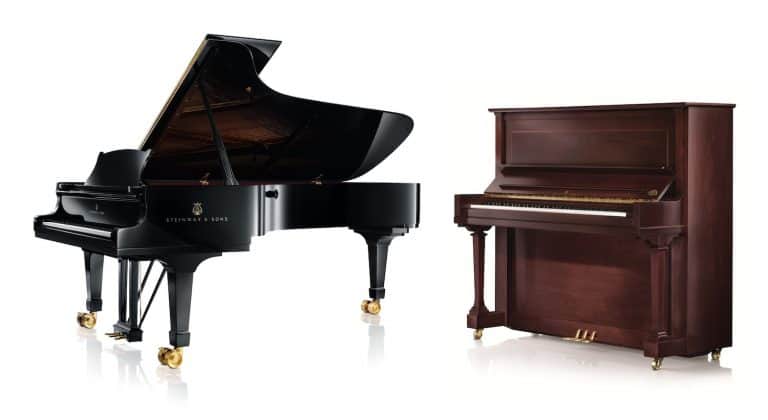
Acoustic Pianos
The piano has been the most popular instrument for the past 300 years. When playing, you can feel the notes resonate through your fingers and around the room. This ‘acoustic’ sound is created from physical parts; no electronics are involved.
Pushing down a key moves a hammer, which in turn hits a string, creating the familiar piano sound. The hammer action gives the key weight against the finger.
The downside of acoustic pianos is that they are the most costly option, and the expense is not restricted to the purchase of the instrument. Moving a piano is expensive, and they need maintenance. You’ll need to turn it twice a year, as a minimum.
A piano cannot be kept in damp conditions or too close to a radiator as they can quickly dry out and warp.
A high-quality piano can hold its value well; but on the flip side, cheap, used instruments are often unreliable and expensive to repair.
Acoustic pianos are available in two forms: grand and upright pianos.
Upright VS Grand Piano
Grand Piano
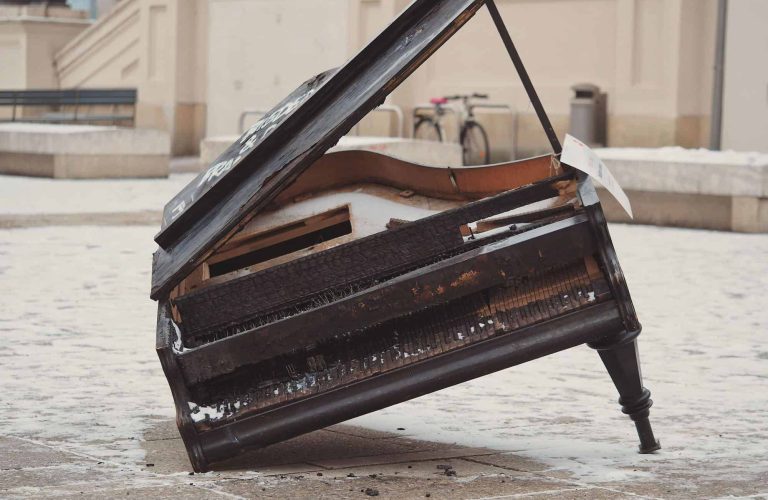
The Grand Piano is the beast of all pianos. They are the loudest, largest, longest and most expensive instruments made. And for a good reason. You can play with such an extensive dynamic range that the quietest quiet’s and the loudest loud’s are possible.
Of course, if you have the money and space, you can do no better than buying a Grand Piano.
Grand Pianos all come in different sizes. The ‘Baby Grand’ is the smallest size and a ‘Concert Grand’ is the largest.
Upright Piano
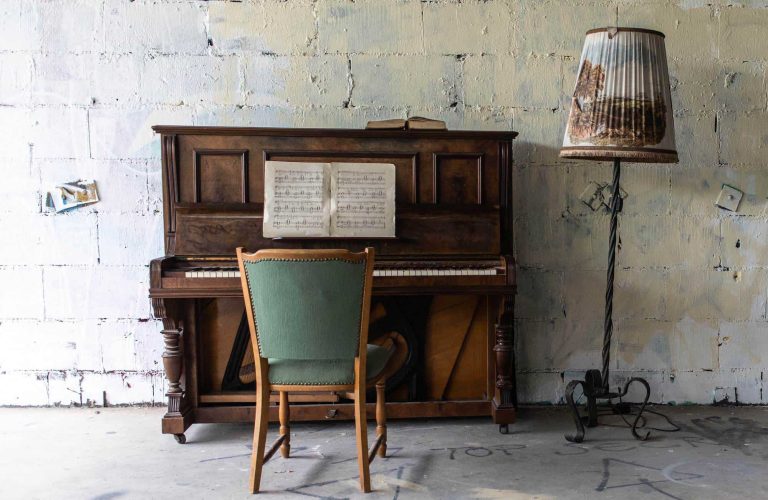
The Upright Piano is taller than a Grand Piano, but the footprint is so much smaller, that they became very popular instruments.
The strings are vertical in the instrument, unlike the Grand where they are horizontal. This makes the upright a slightly lighter feel than a grand piano; but also means the dynamic range is much more limited.
Used in homes, a good Upright Piano can last for a generation.
How To Choose A Piano - Summary
Let’s keep things easy…
If you want the instrument to feel like a piano, but you need to control the noise, or have a small room, go for a Digital Piano
If you have the room and budget for a larger instrument, go for an Acoustic Piano
If you are more interested in the ‘techie’ side of music, and want to experiment with sounds, go for a Keyboard
Hopefully that helps you make up your mind about what type of instrument to buy. Now you’ll need to do some research over which exact model to go for. Lucky for you, we do just that! Just click here to read our Acoustic Piano, Digital Piano or Keyboard reviews.
Get the 4 Things I’ve Been Loving, Using and Reviewing
Instruments, Gadgets, Books and More…
Every Friday, I send out an exclusive email with the four most amazing things I’ve reviewed or used that week.
It could include exclusive giveaways or chances to interact with me, instruments, books, gadgets, music, new techniques/tricks, and — of course — all sorts of fun musical stuff I dig up from around the world.
These ‘4-Feature Friday’ emails are only available if you subscribe to my e-mail newsletter.
Read the next post in this series:




